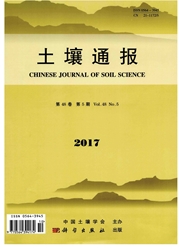

 中文摘要:
中文摘要:
硝酸钙在土壤中累积导致植物生长异常是温室栽培中常见的问题之一。高量硝酸钙何以会引起生长异常尚不十分清楚。本文从植物对硝酸根和钙的生理反应方面进行了探讨。植物对硝酸根的吸收与还原可引起根表和根细胞质pH上升,诱导植物缺铁,高量硝酸根对根系细胞质膜硝酸还原酶的诱导可引起亚硝酸根在根表形成,抑制根系尤其是根毛的生长和养分的吸收;细胞质膜硝酸还原酶有可能促进氧化锰在根表还原而利于锰在植物中的累积。高量可溶性钙既抑制其他阳离子的吸收,又通过对液泡膜阳离子/H^+交换体的诱导,促进钙、锰、锌等离子在液泡中累积,加剧养分缺乏的程度。高硝态氮引起的高细胞质pH和可溶性有机氮含量等等,既可导致缺索症又可致抗病性下降,可能是病害容易发生的生理学原因。控温不好的温室如塑料大棚,昼夜温差大,易加剧细胞质PH的波动,促进离子或溶质在液泡中的累积,易加剧营养失衡,可能是温室生理障碍易发生的环境因素。
 英文摘要:
英文摘要:
The physiological disorder of vegetables grown in greenhouse or other protected production systems is one of the commonly found disorders. It is believed that the accumulation of calcium nitrate in the soil is one of the major factors responsible for the physiological disorder. However, the underlying mechanisms are not well understood. The present paper summaried the results on physiological responses of plants to elevated calcium nitrate in growth media. It was proposed that the induction of plasma -membrane -bond nitrate reductase (PM - NR) by high nitrate concentration promoted nitrite formation in rhizosphere and inhibited root growth and nutrient uptake. The potential reduction of manganese oxides by PM - NR might promote Mn accumulation in plant tissues. High levels of soluble Ca^2+ in growth medium not only inhibited other cation uptake but also induced tonoplast cation/H^+ antiport activity, which in turn might result in the accumulation of Ca^2+ and other cations in vacuoles and nutrient deficiencies such as Mg, Zn and K. Higher cytosolic pH as well as elevated levels of soluble nitrogen compounds reduced disease resistance or repressed defensive gene expression in plants. The greater daily temperature variation in greenhouse or other protected vegetable production systems might promote cation accumulation in vacuoles and make physiological disorders even worse. The control of the accumulation of calcium nitrate in soil was also briefly discussed.
 同期刊论文项目
同期刊论文项目
 同项目期刊论文
同项目期刊论文
 期刊信息
期刊信息
